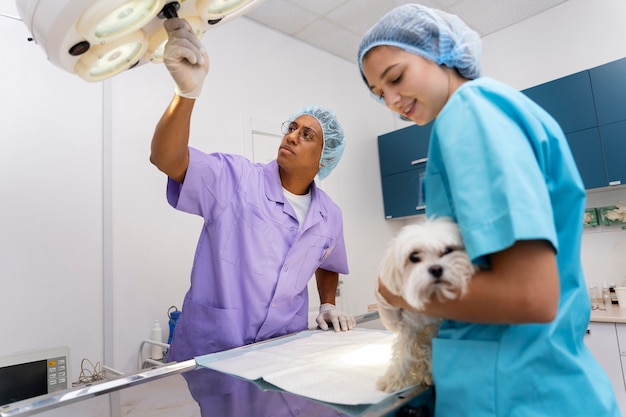New Puppy Care Information


Vaccinations:
- DAPP: (Distemper, Hepatitis or Adeno2 virus, Para Influenza and Parvo-virus). This vaccine is given in a series and is one of the most important things you will ever do to protect your dog’s health. The first DAPP is given around 8 weeks of age and then is repeated every 3-4 weeks until the puppy is 16-20 weeks old. The vaccine is then repeated in one year.
- Leptospirosis: Leptospirosis is a bacteria spread by wildlife and ingested by dogs drinking out of stagnant water or puddles. It can also be contracted by people. It can cause severe kidney and liver damage. It is given in a series of two injections 3-4 weeks apart followed by a yearly booster.
- Rabies: This vaccination is given at or after 12 weeks of age. The next booster is given in one year.
- Bordetella: This vaccination is given to prevent kennel cough which is contagious to other dogs. This vaccine is boostered yearly or in some cases every 6 months.
- Lyme: Lyme disease is a bacterial infection that is transmitted by ticks. The North Easten United States has the highest risk of exposure to Lyme. Monthly prevention may not be enough to protect your dog therefore the vaccine is highly recommended. This vaccine is given in a series of two injections 3-4 weeks apart followed by a yearly booster.
- Canine influenza: Canine influenza is a contagious viral infection. It is transmitted through droplets or aerosols from infected dogs by barking, coughing, or sneezing. Dogs in close contact with other potentially infected dogs in places such as kennels, groomers, or day care facilities are at higher risk. This vaccine is available upon request.
Diet:
Examples of premium pet foods include brands such as Purina Pro Plan, Hills Science Diet, Royal Canin or Iams. Ensure you are getting an appropriate puppy formula for your dog. For example large breed puppies should be on a large breed puppy formula. If these brands are not available to you or your pet, we would recommend that you search for a food that has “AAFCO” printed on the label as this is The Association of American Feed Control Officials.
We recommend that puppies be fed three meals a day until they are 6 months of age or until their spay or neuter. After this they can be transitioned to two meals a day, and then transition to adult food at one year of age. Since puppies are growing rapidly, three meals a day ensures that your puppy is receiving enough calories and nutrition.
Chew toys:
Avoid chew toys that are extremely hard. A rule of thumb is that a chew toy should be soft enough to bend or be able to indent with your fingernail. Pets should always be supervised with toys and chews. Take special caution with fabric or rope toys as pets can chew them apart and swallow pieces of them.
Puppies like to chew on almost anything! Be very careful of what your puppy is allowed to chew and swallow as intestinal foreign bodies requiring surgical removal are most common in dogs under one year of age.
Internal Parasites:
We routinely administer deworming medication to puppies because they are frequently born with roundworms, and several treatments may be necessary to eliminate them. It is recommended to have a fecal exam done at the first and second visit, and then yearly thereafter.
Monthly Preventatives:
Monthly flea, tick, and heartworm preventatives are recommended year round for your pet. Preventatives will protect your pet from fleas which cause itching and other skin problems on top of transmitting disease to animals and people. Preventatives will protect your pet from ticks which transmit Lyme disease. Preventatives will also protect your pet from heartworms which are transmitted through mosquito bites. In adulthood the heartworm lives in the heart and pulmonary arteries and is fatal if not treated or prevented.
Protect your pet with the 3-in-1 chewable tablet Simparica Trio. Administer this tablet on the same day each month and receive 30 days of protection from fleas, ticks, and heartworms. Other popular products include Nexgard and Simparica for flea and tick prevention. Interceptor plus and Heartgard plus are popular heartworm preventatives as well.
Spay & Neuter:
We recommend that female dogs not intended for breeding be spayed at approximately 6 months of age (prior to their first heat cycle). Female dogs spayed prior to their first heat cycle enjoy a 99% reduction in the incidence of mammary cancer.
Male dogs not intended for breeding should be neutered at approximately 6 months of age. Neutering helps prevent prostate disease and minimize certain behavioral problems.
*It is recommended that large breed dogs wait till approximately 8 month of age to be spayed/neutered
*Gastropexy (stomach tacking) is recommended in large breeds or dogs with deep chests. This will prevent the dog from bloating which requires immediate surgery if it occurs.
Dental Care:
Appropriate dental care may be the most important thing that you can do to improve the quality and longevity of your dog’s life.
The first concern is that your puppy’s permanent (adult) teeth erupt in a proper fashion. All of your puppy’s permanent teeth should be present by 6 months of age. If primary (baby) teeth are still present, they will need to be extracted or they will cause bite and periodontal disease problems.
For long term dental health a combination of brushing and periodic cleanings are recommended. Now is the time to train your puppy to allow you to handle his/her mouth. Brushing the teeth should occur every day or at least every other day. This can be done with a soft bristled brush or finger-brush with pet toothpaste. Try to make this a fun and positive experience for your pup! Give plenty of praise and even some treats!
Identification:
We recommend some kind of identification for all pets. We offer a Pet Link microchip. This is given by a simple injection under the skin during an office visit or preferably at the time of their spay/neuter while under anesthesia. Visit www.petlink.net for more information.
Emergencies:
For after hours emergencies contact one of the following emergency hospitals:
- PVSEC South at 724-809-2000
- PVSEC North at 412-366-3400
- MedVet at 724-717-2273
- AVets at 412-373-4200
These are all 24 hour emergency/critical care/referral centers.
It is our goal to provide you with the highest quality services and information so you can have the best possible relationship with your dog and give them a long and healthy life!



















